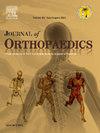Countermovement jump and vertical hop demonstrate braking/deceleration and performance alterations after ACL reconstruction with BMA, DBM, and suture tape augmentation
IF 1.5
Q3 ORTHOPEDICS
引用次数: 0
Abstract
Objectives
This study evaluated countermovement jump and Single Leg Jump measures to identify landing measures that best distinguish a novel Anterior Cruciate Ligament reconstruction technique using bone marrow aspirate, demineralized bone matrix, and suture tape augmentation patients from controls. The secondary objective assessed performance differences between operated and non-operated limbs post-reconstruction. The hypothesis was that novel Anterior Cruciate Ligament reconstruction patients at return to sport would not differ from controls during landing and that the operated limb's performance would not differ from the unoperated limb.
Methods
The study included 31 patients with the novel reconstruction technique matched with controls in a 1:10 ratio based on age, sex, weight, and height. Both groups underwent screening and were compared during a Countermovement Jump. Using a Sparta Science Force Platform, each patient's unoperated and operated limbs were also compared for Single Leg Jump post-op (6.5 months).
Results
Test patients showed no difference in center of pressure during landing of both jumps compared to controls (P=0.27) and the uninvolved limb (P=0.26). Test patients exhibited increased braking impulse relative to the uninvolved limb during Single Leg Jump (P<0.001). Deceleration upon landing of Countermovement Jump was also increased compared to controls (P<0.001). Test patients demonstrated slower concentric time during a Countermovement Jump compared to controls (P=0.03) and significantly slower compared to the uninjured leg (P<0.001). Countermovement Jump height was decreased compared to controls (P<0.001). Single-leg jump height was decreased in the injured limb compared to the uninjured limb (P<0.001).
Conclusions
Test patients did not show significant differences in landing motion compared to controls or the uninvolved leg. However, power and performance alterations were evident at Return to Sport after reconstruction. Although these results are quite promising, they may be too preliminary to draw definitive conclusions. Double and single-legged assessments should be considered in return-to-sport decision-making.
用 BMA、DBM 和缝合带增量法进行前交叉韧带重建后,逆向跳和垂直跳表现出制动/减速和性能变化
目的本研究评估了反运动跳跃和单腿跳跃的测量方法,以确定最能将使用骨髓抽吸物、脱矿骨基质和缝合带增强的新型前交叉韧带重建技术的患者与对照组患者区分开来的着地测量方法。次要目标是评估重建后手术肢体和非手术肢体的表现差异。研究假设新型前交叉韧带重建术患者在重返运动场时与对照组患者在着地时不会有差异,手术后肢体的表现与未手术肢体的表现也不会有差异。研究包括 31 名采用新型重建技术的患者,根据年龄、性别、体重和身高与对照组患者按 1:10 的比例进行匹配。两组患者都接受了筛查,并在反向运动跳跃中进行了比较。结果与对照组(P=0.27)和未受累肢体(P=0.26)相比,测试患者在两次跳跃着陆时的压力中心没有差异。在单脚跳时,与未受累肢体相比,测试患者表现出更大的制动冲力(P<0.001)。与对照组相比,反向运动跳跃落地时的减速也有所增加(P<0.001)。与对照组相比(P=0.03),测试患者在反向移动跳跃过程中的同心时间较慢,与未受伤的腿相比也明显较慢(P<0.001)。与对照组相比,反向运动跳跃高度降低(P<0.001)。结论与对照组或未受伤的腿相比,试验患者在着地运动方面没有表现出显著差异。然而,在重建后重返运动场时,力量和表现发生了明显变化。虽然这些结果很有希望,但可能过于初步,无法得出明确的结论。在进行重返运动决策时,应考虑双腿和单腿评估。
本文章由计算机程序翻译,如有差异,请以英文原文为准。
求助全文
约1分钟内获得全文
求助全文
来源期刊

Journal of orthopaedics
ORTHOPEDICS-
CiteScore
3.50
自引率
6.70%
发文量
202
审稿时长
56 days
期刊介绍:
Journal of Orthopaedics aims to be a leading journal in orthopaedics and contribute towards the improvement of quality of orthopedic health care. The journal publishes original research work and review articles related to different aspects of orthopaedics including Arthroplasty, Arthroscopy, Sports Medicine, Trauma, Spine and Spinal deformities, Pediatric orthopaedics, limb reconstruction procedures, hand surgery, and orthopaedic oncology. It also publishes articles on continuing education, health-related information, case reports and letters to the editor. It is requested to note that the journal has an international readership and all submissions should be aimed at specifying something about the setting in which the work was conducted. Authors must also provide any specific reasons for the research and also provide an elaborate description of the results.
 求助内容:
求助内容: 应助结果提醒方式:
应助结果提醒方式:


